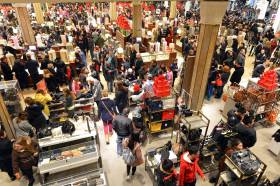The bigger the bust, the bigger the spending
Alibaba has a lot of consumer data at its fingertips as one of the largest e-commerce companies in the world. And just what insights is the Chinese online giant gleaning from that data? Well, Alibaba has linked women’s bra size to their online shopping habits—and it found that the bigger the cup size, the bigger the spending.
The data point no one asked for!
Alibaba vice president Joseph Tsai talked to Quartz about findings that 65% of women with a B cup fell into the “low” spending category, while those with a C cup or higher were in the “middle” and “high” demographics.
“We’ve only seen the tip of the iceberg,” he said of the company’s data-dive. “We really haven’t done even 5% of leveraging that data to really make our operations more efficient, consumers more satisfied.”
Considering that Alibaba had a whopping $9 billion in sales during Singles’ Day—the 11/11 holiday involving epic amounts of retail therapy—who knows what other bizarre spending trends it will find.
[Quartz]







